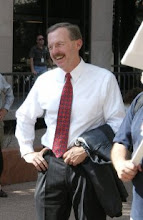 Group Preserves Legacy of OSS, Predecessor to CIA
Group Preserves Legacy of OSS, Predecessor to CIABy Gregg MacDonald
Fairfax County Times
Thursday, September 30, 2010; VA16
Art Reinhardt of Great Falls was in China on Aug. 6, 1945 -- the day the United States dropped the "Little Boy" atomic bomb on Hiroshima, Japan.
Although only 20 at the time, he already was keenly aware that his short service with World War II's Office of Strategic Services soon would be coming to an end.
The OSS -- the predecessor to the CIA and U.S. Special Operations Forces -- was formed in June 1942 by order of President Franklin Delano Roosevelt.
The agency's mission was to collect and analyze strategic intelligence requested by the Joint Chiefs of Staff, and to conduct "special" operations outside the scope of other agencies.
"The OSS was the first centralized foreign intelligence agency in U.S. history and was organized along the lines of some of the chief responsibilities of CIA today: analysis, collection, counterintelligence and covert action," CIA spokeswoman Donna Weiss said.
Reinhardt, 85, was recruited by the OSS in May 1944, shortly after joining the U.S. Army Air Corps at 17.
After being recruited, Reinhardt received advanced OSS training as a radio operator and cryptographer at "Area C" in Prince William County -- a one-square-mile tract of heavily wooded land about five miles west of Quantico where the OSS trained its agents from 1942 to 1945. Today the training area is preserved as part of Prince William Forest National Park and is open to the public.
"From 1942 to 1945, the communications branch of the OSS used the area as a training facility for about 1,500 communications personnel learning international Morse code, ciphering, weapons, demolition, self-defense and physical training," Reinhardt said.
After three months of training, Reinhardt was deployed to China to provide intelligence targets for Air Force bombers attempting to disrupt the Japanese occupying forces that had taken control of key Chinese railways and seaports.
While in China, Reinhardt lived the life of a secret agent. He spent much of his time in remote forested areas, living off the land and being sure not to draw much attention from locals.
"As American agents in China, we had a bounty on our heads," he recalled. "It was rumored that Japanese soldiers were offered the equivalent of $50,000 to capture one of us."
Reinhardt decoded incoming communications and encoded outgoing messages, transmitting them from his portable SSTR-1 "suitcase" radio.
"One of my daily duties from the field was to give hourly weather reports for the B-29 bombers," Reinhardt said. He soon discovered he was on his own in terms of scrounging up food and supplies.
"I ate a lot of rice," he said.
Once, after discovering he had no antennae wire, he improvised by scavenging materials from a discarded B-24 bomber and made his own.
"I was a free spirit," he recalled. "I had no uniform, and often no orders. It was very easy to forget that I was in the military."
Reinhardt left China not long after the Hiroshima bombing. The OSS was disbanded the following month -- September 1945.
In 1947, Reinhardt joined the ranks of the newly formed Central Intelligence Agency.
"When the CIA was created in 1947, it built on the solid foundation of the OSS, and many of our officers drew on their OSS experience to build the new agency and meet the new postwar challenges," Weiss said. "The agency inherited its very DNA from the OSS, an organization of courageous men and women who made decisive contributions during and after the war."
Reinhardt retired in 1976. Today, he is treasurer of the McLean-based OSS Society, which lists President H.W. Bush, Ross Perot and James R. Schlesinger as honorary chairmen. The nonprofit organization will honor Perot at its annual award dinner Saturday.
"At its peak, there were nearly 13,000 active OSS agents and operatives," said OSS Society President Charles Pinck, 46. "Today, there are about 200 [to] 300 left."
Pinck, the son of legendary OSS agent Dan Pinck, said the original organization, founded in 1947 as Veterans of the OSS, changed its name in 1998 to the OSS Society.
The elder Pinck also served behind enemy lines in China and wrote a memoir, "Journey to Peking: A Secret Agent in Wartime China," about his time in the OSS.
"It's sad, but we basically had to prepare for a time when the organization would have to continue on with no actual OSS veterans left," Charles Pinck said. The group today includes CIA and Special Operations Forces members.
Reinhardt recently donated his rare suitcase radio to the society.
"I am proud to have served in the OSS communications branch," he said. "Communications underpinned everything OSS ever did, and I dedicate my field radio to all the men and women who served in the communications branch during WWII."
For information about the U.S. Office of Strategic Services, including documents and books relate to its history, visit http://www.ossreborn.com.Sphere: Related Content




No comments:
Post a Comment